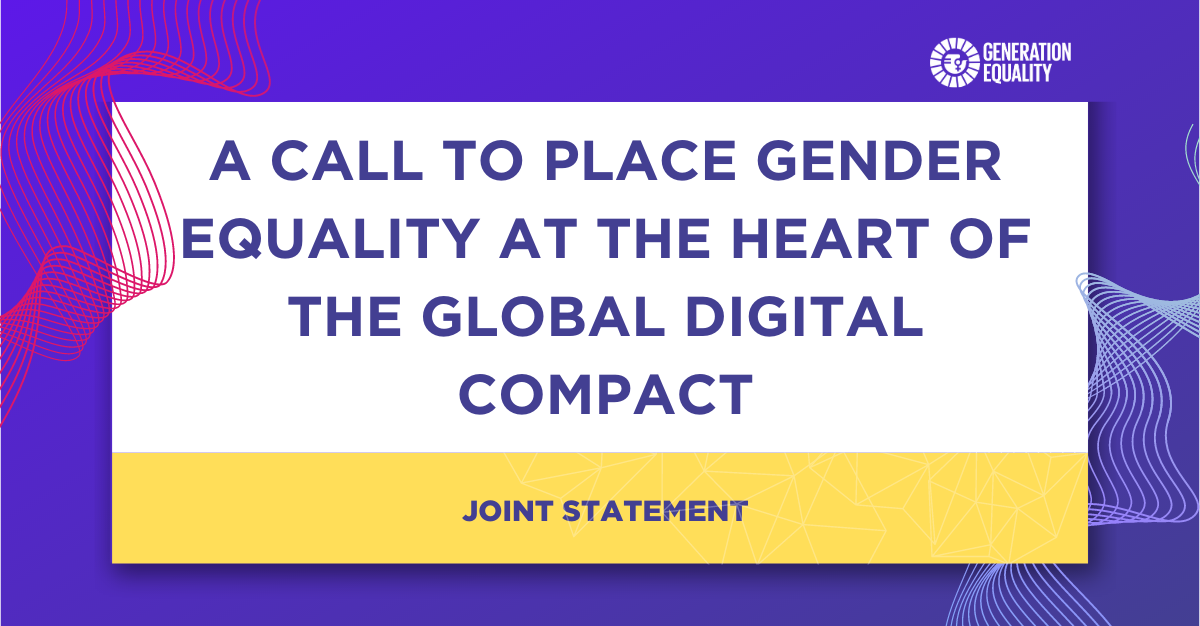
The choices that will be made to develop shared principles for an open, free and secure digital future for all - the “Global Digital Compact” - will shape the digital transformation of our societies for the years to come. If we fail at intersecting the digital evolution and gender equality, the world will miss out on the opportunity to build a better, safer and more equal future.
In the past years, we have seen how technology often reinforces a pernicious cycle in which existing inequalities and stereotypes are amplified and perpetuated. To break this cycle, the Action Coalition on Technology and Innovation for Gender Equality is uniting public, civil society and private partners to revitalize the global partnership for the achievement of SDG 5 and spark a world lean towards a gender-diverse digital transformation.
Gender equality is not an isolated goal: it is critical to securing a sustainable future for the planet, addressing the root causes of poverty and upholding human rights, to leave no-one behind. Our call to adopt a feminist approach to the Global Digital Compact is much more than considering women and girls in all their diversity; rather, it is the most effective path to securing a sustainable digitalization and building a digital society which works for everyone.
If we are to maximize the impact of the process ahead, we believe the development of the Global Digital Compact should embrace the principles and values that have made the preparation of the Beijing Platform for Action and more recently Generation Equality a success:
An inclusive design, which facilitates the inclusion of diverse voices and stakeholders, in particular those of young people and those in marginalized positions or in situations of vulnerability, whose human rights might be threatened, and ensures accessibility for persons with disabilities.
An intersectional lens, which takes in consideration the multidimensionality of people’s lived experiences and recognizes the prevalent power dynamics and systems of inequality and discrimination, and meaningfully and intentionally works to counter them.
An emphasis on Feminist Leadership, which acknowledges that women are often under-represented in decision-making processes, particularly on digital cooperation, and works consciously to redistribute power and responsibility to secure their equal participation.
We have until the end of March 2023 to participate in the open consultative phase of the Global Digital Compact and voice our inputs, individually and collectively. Building on the Generation Equality “Global Acceleration Plan”, the UN Secretary “Our Common Agenda” and the principles that will guide the preparation of the 67th session of the Commission on the Status of Women, we share below recommendations that allow us to reimagine digital cooperation and collectively build the future specifically toward this change:
1. Addressing the gender dimensions of digital inequality: the Global Digital Compact should help connect all people to the internet and address the underlying causes of digital inequality, including discriminatory structures, social norms and gender stereotypes. Of the estimated 2.9 billion people still offline, the majority are women and girls, who are less likely to own a mobile phone, use the internet or know how to leverage digital technology. Now is the time to recognize digitalization as a tool to achieve gender equality, social justice and poverty eradication and make meaningful connectivity a policy priority. This will require dedicated funding and investments, education and inclusive policies, solutions relevant for people living in remote areas and in vulnerable situations, tackling discriminatory norms and practices online and offline as well as other necessary means.
2. Embedding gender in digital technologies: the Global Digital Compact should promote the regulation of artificial intelligence based on trust and human-rights and secure digital commons as a global public good. Digital technologies, platforms and tools may reinforce harmful gender stereotypes and discriminate against women and girls, unless they are designed to be safe, inclusive and accessible from the start. Gender biases found in data sets and coded in AI algorithm products may also lead to systems and services replicating patterns of discrimination. Now is the time to embed accountability, gender equality and non-discrimination in technology development, leverage data science for evidence-based solutions and systematize the use of gender impact assessments, to ensure technological advancements build trust and equally benefit women and girls in all their diversity.
3. Building inclusive innovation ecosystems: the Global Digital Compact must help reshape the current innovation and startup ecosystems that greatly lack gender diversity and are characterized by an uneven distribution of power and financial resources. The insufficient number of women especially in leadership and technical positions and their limited access to funding restricts the emergence of transformative and inclusive technological development. Now is the time to broaden intentional pathways for women and girls’ advancement in technology, to ensure their equal access to and full participation in technical and decision spaces.
4. Making digital spaces safe: the Global Digital Compact should apply human rights online, protect personal data and privacy and promote accountability for discrimination and misleading content. Women and girls, and especially those who face greater risk for multiple and intersecting forms of discrimination, are the primary targets of online violence and abuse, which push them out of public participation, conversations and digital spaces more broadly. Now is the time to protect the online space, by challenging digital harassment and democratic backsliding, and making those who govern digital platforms accountable.
As expressed by the Secretary General of the United Nations in his Common Agenda Report, “we are at an inflection point in history”. Now is the time to break the cycle of digital inequality and join forces to build a Global Digital Compact that will ensure an open, safe and equal digital future for the generations to come.
|
To ensure digital transformation which works for everyone, take a stand and share your inputs to the Global Digital Compact to make gender one of the top priorities. |
The leaders of the Action Coalition on Innovation and Technology for Gender Equality: A+ Alliance, the Government of Armenia, the Government of Chile, Digital Grassroots, the Government of Finland, the Global Fund for Women, ITU, Koç Holding, Microsoft, The Rockefeller Foundation, the Government of Rwanda, Social Builder, the Government of Tunisia, UNICEF.
|
If you wish to support this statement and see the name of your organization included below, register your endorsement here. |
This joint statement has been endorsed by the following entities:
Organizations
- Girl Effect
- World Pulse
- Action 4 Women and Children, NPO
- Fundación Microfinanzas BBVA
- De Doronos-Jay Limited
- Women in AI & Robotics
- Village Farmers Initiative
- South West Grid for Learning
- Social Builder
- Sima Community Based Organization
- Asociación Regional Mujeres Ingenieras
- Association au Secours des Filles Mères (ASFM)
- Anankemag.com
- Beneby Enterprises, llc.
- GSMA
- Gender Equality Council, Parliament of Georgia
- BFA Global
- Globesight
- The Association for Youth Well Being (YWB)
- girls Community RDC
- UNU-MERIT
- Solidarite Numerique Education et Sante Castres (SNESC)
- Vijay Computer Academy
- Breaking Silence Movement
- Canadian Federation of Business and Professional Women
- MY World Mexico
- EnREDando Salud
- Dcenturyvibes Global International Foundation
- Kashif Organization
- WECF International
- <A+> Alliance for Inclusive Algorithms
- Women@TheTable
- Gender Fair
- Women and Information Society NGO
- RECODEFSenegal
- Institute for Climate and Peace
- AFeDDA
- Association d'Aide à l'Education de l'Enfant Handicapé (AAEEH)
- Genit Care Africa
- Business and Professional Women Yennenga Burkina Faso
- Red Iberoamericana "El Derecho Informatico"
- Vision Communautaire (VICO)
- Women's Intercultural Network
- ICWIN
- Women's Equality Coalition
- Association pour le Devenir des Autochtones et de leur Connaissance Originelle (ADACO)
- Collectif Sénégalais des Africaines pour la Promotion de l'Éducation Relative a l'Environnement (COSAPERE)
- Pro Mujer
Individuals
- Sheila Beladinejad
- Dab Khibunda
- Luisa Ribeiro Lopes
- Mahadi Buthelezi
- Thabelo Patricia Silidi
- Riya Mehta
- Anurag Maloo
- Sabin Muzaffar
- Melissa Covarrubias
- Ernestine Ngo Melha
- Gail James
- Nino Tsilosani
|
|
